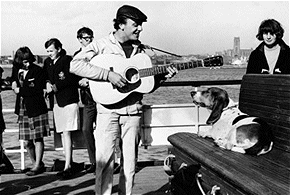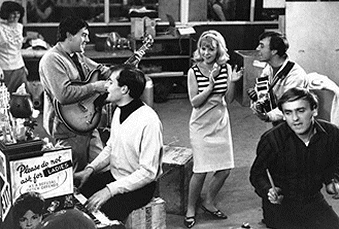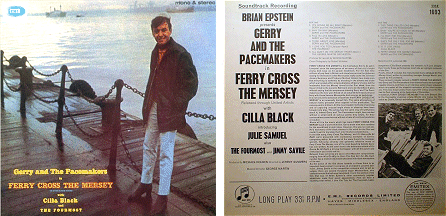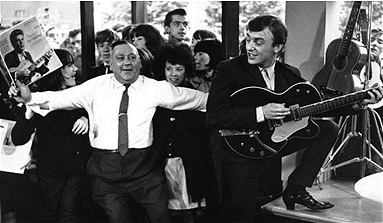Sixties
City presents
a wide-ranging series of
articles on all aspects of the Sixties, penned by the creator of the iconic
60s music paper Mersey
Beat
|
Sixties
City presents
a wide-ranging series of
articles on all aspects of the Sixties, penned by the creator of the iconic
60s music paper Mersey
Beat
|
|||||
|
 |
An
88-minute, black and white film, released in 1965, starring Gerry
& The Pacemakers, featuring Cilla Black
and Julie Samuel. It was directed
by Jeremy Summers and scripted by David Franden from an original idea
by Tony Warren. ‘Ferry ‘Cross The Mersey’ could well be the anthem of
the Mersey music scene. Gerry Marsden, ebullient leader of Gerry & The
Pacemakers, noted for his toothy grin and distinctive voice, treading
the decks of a Mersey ferryboat singing the song he wrote for his film
debut, is an image firmly rooted in the lore of British beat music of
the 1960s.
The movie was the first and only film about beat music made in Liverpool during the Mersey boom. Gerry & the Pacemakers were the second group to be signed by Brian Epstein and they leapt to the top of the charts with ‘How Do You Do It?’. Ironically the number, penned by Mitch Murray, was originally George Martin’s choice as The Beatles second single. The Beatles recorded it but preferred their own number ‘Please Please Me’ and convinced Martin he should release that instead. Gerry followed his chart-topper with two further No1 hits, ‘I Like It’ and ‘You’ll Never Walk Alone’, becoming the first British artist to have a hat trick of No1’s with his first three releases – a record he held until the 1980s when another Liverpool band, Frankie Goes To Hollywood, equalled it. Appropriately, the ‘B’ side of one of Frankie’s No1 hits was ‘Ferry ‘Cross The Mersey’. There had been several films set in and around Merseyside prior to ‘Ferry ‘Cross The Mersey.’ They included ‘The Magnet’, ‘The Clouded Yellow’ with Trevor Howard and Jean Simmons, ‘Violent Playground’ with Stanley Baker, ‘I Thank A Fool’ with Susan Hayward, ‘Another Time, Another Place’ with Lana Turner and Sean Connery and ‘Waterfront’ with Richard Burton. ‘Ferry ‘Cross The Mersey’ couldn’t be described as the first musical set in Liverpool as there had been ‘These Dangerous Years’ with Frankie Vaughan. Gerry & The Pacemakers were the stars of ‘Ferry ‘Cross The Mersey’, which also featured guest appearances from Cilla Black and the Fourmost. Various other exponents of the Mersey sound were in the background of some scenes – the Kirkbys in a music shop and Earl Royce & The Olympics, The Black Knights, The Blackwells and other groups in a dancehall sequence. Scenes included a Cavern performance by Gerry & The Pacemakers; Frank Hessy’s music store; a Mersey ferry and a climactic music contest at the Locarno Ballroom. |
|
Cilla and the Fourmost were appearing at the London Palladium at the time
and travelled to Liverpool on their days off to film their Locarno guest
spots. Cilla sang one song, ‘Is It Love?’ penned by her husband Bobby Willis.
The Fourmost sang ‘I Love You Too’, which was later recorded by Matt Monro.
Other location sequences were filmed at Speke Hall, Manchester Airport,
the Albert Dock and in various streets around Liverpool. The group’s bass guitarist Les Chadwick commented, “We spent six weeks in London first, filming the interiors such as the Chinese restaurant and a boarding house. Then we moved up to Liverpool for the exterior shots in the Cavern and Locarno. “The film tells the average story of a group. It could be any group – it’s supposed to be us, but it isn’t. Gerry and I are friends and we go to the Art School. We meet Les and Freddie who work in a warehouse". "We form a group and play around Liverpool a bit and perform a number in the warehouse. Gerry’s film girlfriend brings a manager round to see us in the warehouse and he likes us. He buys us some new equipment – and in the music shop we perform another number. ‘It’s Gonna Be All Right’ is the initial song at the beginning of the film and, together with the title song, is the theme throughout". "We do numbers in all sorts of odd places - in one scene we’re invited to a house in which we find an antiquated guitar, a piano, an old drum and a harp. We begin to play them and I play the harp as if it were a double-bass. After we’d finished filming the scene, an actor who plays the part of a butler came up to me and said ‘I like your group, it’s a unique idea to have a harp in a rock group.’ I didn’t dare tell him I play bass!”. United Artists released the film in Britain in January 1965 as part of a double bill with ‘For Those Who Think Young.’ At the same time, Columbia issued a 12-track soundtrack album which featured nine original numbers penned by Gerry Marsden, an instrumental ‘The Liverpool Scene’ by the George Martin Orchestra and songs from The Fourmost and Cilla Black. One woman, interviewed in the newspaper Mersey Beat following her visit to see the film at a local cinema commented, “It’s just like a look into hell.” Gerry answered, “I hope to do a horror film and she can play a witch!”. |
 |
 |
The Synopsis: Ecstatic squeals of teenage girls pack Manchester Airport
as a Boeing 707 returns Gerry and The Pacemakers from an American tour.
Fans crush round their two chauffeur-driven Rolls-Royces, which finally
draw away taking Gerry and the boys to a recording studio. There, after
a tousled girl has been extracted from the boot, Gerry and The Pacemakers
start cutting a new disc. Flashback: A voice introduces “Liverpool and the
Mersey….” Gerry and his group have not yet been discovered, but at the Cavern
Club they are already setting the pace with their own screaming following
of kids each night. Gerry is the scourge of a respectable guest house, run by his aunt, Mrs Taggart, whom he affectionately calls Aunt Lil. His fellow-boarders are Lumsden, an undertaker who wishes Gerry was underground and a genteel spinster, Miss Kneave, who veers between giggles and frigid shock. Gerry leaps on to his Lambretta and heads for the Mersey ferry and Art School across the water. Already on board are Chad, Les and Fred, and before long the group is working out a competition number that has the boat rocking. They split up on the other side of the river. Fred and Les make for the Glossbrite Sanitary Fitment Co. Ltd., where they work, while Gerry and Chad go off to the Liverpool College of Art. At the art school Dodie awaits; a pretty young blonde who reckons Gerry is the gear. Above all she wants him and the boys to win the competition being run to find the Merseyside group that will compete in the European Beat Group Contest. As the students drift in, it’s plain that Gerry is stuck on Dodie too. The class begins under the stern eye of the art master, Trasler, and not until he leaves the room does Gerry get the chance to lay down his brush for a guitar and start the joint jumping again. Waiting on the college doorstep is Mojo, a stray dog who has adopted Gerry and accompanies him to the Yung Wah Chinese Restaurant to meet the rest of the Pacemakers for lunch. The chopsticks are an irresistible temptation to drummer Fred and Les is drawn helplessly to the keyboard of a conveniently parked piano as another number starts. |
| A lively
bunch of youngsters quickly surround the boys and even the manager enjoys
the scene, although he has a hard time keeping his staff in the kitchen.
Later that day Dodie calls on Hanson, an agent, and asks him to come and
hear the group at the Glossbrite Sanitary Fitment Co. warehouse that evening.
So, amid the baths and washbasins, Gerry and the boys get the big beat going
and the warehouse girls screaming. At the end of the number they find they
have an agent to enter them for the contest. They also have their first
autograph hunters. After wishing a fond goodnight to Dodie, Gerry goes home
to Aunt Lil – and a very different kind of music. The soiree is hilarious with Gerry on a wooden bird-caller breaking it up in disorder. Gerry retreats to his room, soundproofs the door with padding, and listens in peace to his transistor radio. First thing next morning a message from Dodie arrives, which Aunt Lil hurries up to Gerry. Finding the door sealed, she and Lumsden panic, their imaginations running riot for a moment, and the undertaker forces the door, but Gerry is very much alive and soon on his way to Dodie with the other Pacemakers. Dodie’s father, Colonel Dawson, is a shipping magnate with a luxurious mansion outside Liverpool. A supercilious butler ushers the boys into the music room, but as soon as they begin practicing their song for the contest they have the maids shaking and the butler almost managing a smile. On the day of the contest, agent Hanson takes the boys to a music shop to buy them new instruments. Once again, the Pacemakers’ sound draws a crowd of youngsters that multiplies and spreads over the street until the traffic snarls to a halt. Reluctantly, Lumsden hires out a mourner’s limousine to Gerry and the boys. After joining a passing funeral, then becoming involved in various mishaps, it gets them to the competition ballroom just in time. The dance floor is packed tight, and Gerry’s own fans are there too. The other entries are greeted enthusiastically, but it is Gerry and The Pacemakers who bring the house down. Through the pandemonium they play an encore, and shouting through the screams, Hanson announces what everyone already knew – Gerry and The Pacemakers have won. Another group has been born on Merseyside. |
 |
|
Article
Text
UK
web hosting by
|